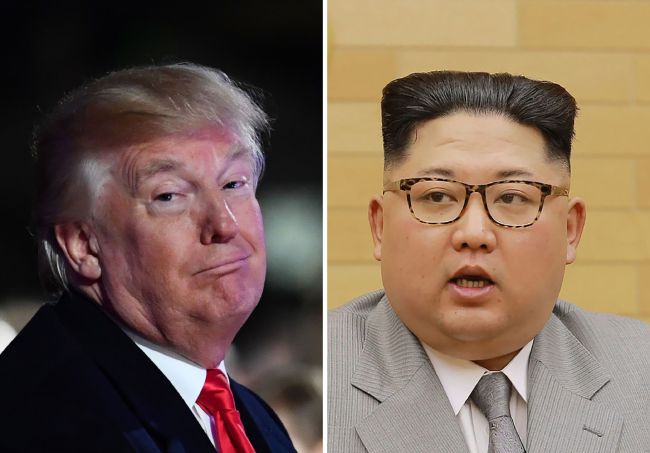Will inter-Korean thaw open way for direct talks between US and NK?
By Yeo Jun-sukPublished : Jan. 7, 2018 - 15:31
With US President Donald Trump expressing his willingness to talk directly with North Korea over its nuclear program, expectations are high over whether the resumption of inter-Korean dialogue would open the way for direct talks between Washington and Pyongyang.
In a shift from his bellicose rhetoric, Trump said he is open to speaking one-on-one with North Korea’s leader Kim Jong-un after the two Koreas agreed to hold their first high-level talks since 2015 to discuss North Korea’s potential participation in the PyeongChang Winter Olympics.
“Absolutely, I would do that. I have no problem with that at all” Trump said in a news conference at Camp David on Saturday, while pining hopes that the inter-Korean talks would lead to “a great thing for humanity and the world.”
Trump, however, stressed that the talk could take place under the right conditions, saying North Korean leader Kim jong-un knows that he is “not messing around” in his pledge to address the North’s military threat against the US and its allies.

While complete denuclearization of North Korea appears to remain a prerequisite for potential bilateral talks, the Trump administration has become more open to direct talks than before as it is eager to gauge Pyongyang’s willingness to abandon its nuclear program, analysts said.
In a speech to the Council on Foreign Relations in October, Joseph Yun, the State Department‘s special representative for North Korea policy, said that if North Korea went 60 days without testing a missile or a nuclear weapon, it could be a sign that Pyongyang was open to dialogue.
“I think the Trump administration might be interested in talks with North Korea to see if they are sincere about denuclearization,” said Shin Beom-chul, a professor at the Korea National Diplomatic Academy in Seoul.
Trump can be serious about direct talks with the North Korean leader because he wants to compensate his low-approval rating prior to the mid-term election with diplomatic breakthrough, said Kim Yeol-Su, senior researcher at the Korea Institute for Military Affairs.
The prospect of direct talks, however, ultimately rests on how serious North Korea is about denuclearization efforts, Kim added, noting that the dialogue is only possible if North Korea accepts the allies’ decision to postpone the joint military drill as a condition for talks.
South Korea and the US decided to postpone their annual military exercise Key Resolve and Foul Eagle until after the Winter Olympics and Paralympic Games, which are to be held from Feb. 9-25 and from March 9-18, respectively.
“Trump has to show tangible accomplishment on North Korea’s nuclear program no later than July or August before the mid-term election in November. If it goes toward dialogue, not a military option, it couldn’t be better for Trump,” Kim said.
“If North Korea is serious about denuclearization talks, they should accept (the decision to delay the exercise) as meeting one of the conditions for talks and refrain from asking for complete suspension of joint military drills. Then, we could see the likelihood of direct talks (between the US and North Korea),” he added.
When he showed his willingness to send a North Korean delegate to the Olympics through his New Year’s address, Kim Jong-un urged South Korea to stop its nuclear war drill with foreign nations and withdraw itself from any invasion attempt on North Korea.
Mindful of the decision’s impact on the readiness posture, the White House avoided saying that the exercise was postponed. Instated, it announced that the allies agreed to “de-conflict” the Olympics and the military exercise so that they “can focus on ensuring the security of the Games.”
(jasonyeo@heraldcorp.com)


![[AtoZ into Korean mind] Humor in Korea: Navigating the line between what's funny and not](http://res.heraldm.com/phpwas/restmb_idxmake.php?idx=644&simg=/content/image/2024/04/22/20240422050642_0.jpg&u=)
![[Exclusive] Korean military set to ban iPhones over 'security' concerns](http://res.heraldm.com/phpwas/restmb_idxmake.php?idx=644&simg=/content/image/2024/04/23/20240423050599_0.jpg&u=20240423183955)



![[Graphic News] 77% of young Koreans still financially dependent](http://res.heraldm.com/phpwas/restmb_idxmake.php?idx=644&simg=/content/image/2024/04/22/20240422050762_0.gif&u=)
![[Herald Interview] Why Toss invited hackers to penetrate its system](http://res.heraldm.com/phpwas/restmb_idxmake.php?idx=644&simg=/content/image/2024/04/22/20240422050569_0.jpg&u=20240422150649)





![[Exclusive] Korean military to ban iPhones over security issues](http://res.heraldm.com/phpwas/restmb_idxmake.php?idx=652&simg=/content/image/2024/04/23/20240423050599_0.jpg&u=20240423183955)



![[Today’s K-pop] Ateez confirms US tour details](http://res.heraldm.com/phpwas/restmb_idxmake.php?idx=642&simg=/content/image/2024/04/23/20240423050700_0.jpg&u=)